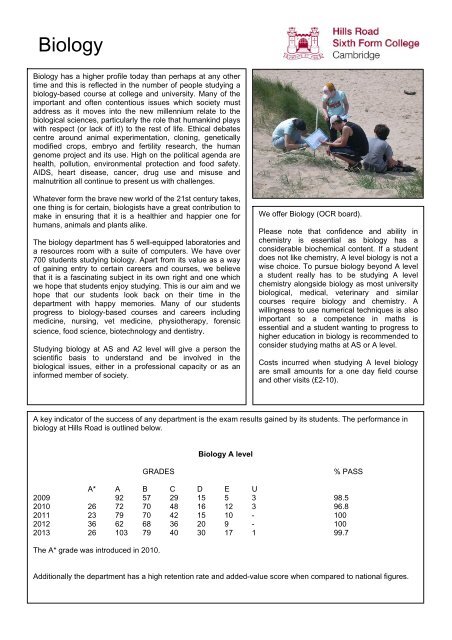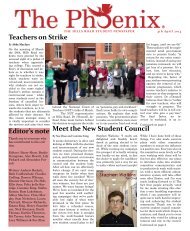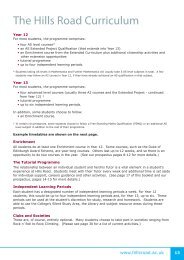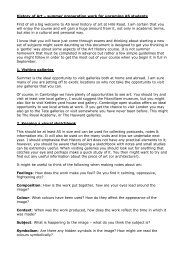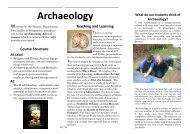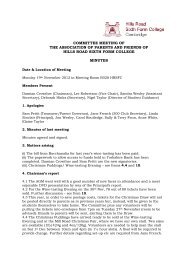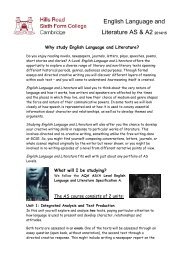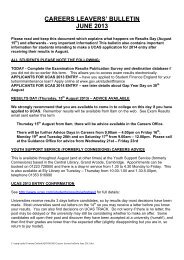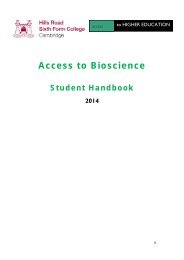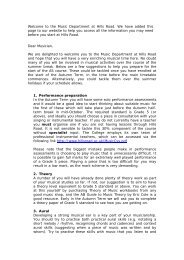Biology - Hills Road Sixth Form College
Biology - Hills Road Sixth Form College
Biology - Hills Road Sixth Form College
Create successful ePaper yourself
Turn your PDF publications into a flip-book with our unique Google optimized e-Paper software.
<strong>Biology</strong><br />
<strong>Biology</strong> has a higher profile today than perhaps at any other<br />
time and this is reflected in the number of people studying a<br />
biology-based course at college and university. Many of the<br />
important and often contentious issues which society must<br />
address as it moves into the new millennium relate to the<br />
biological sciences, particularly the role that humankind plays<br />
with respect (or lack of it!) to the rest of life. Ethical debates<br />
centre around animal experimentation, cloning, genetically<br />
modified crops, embryo and fertility research, the human<br />
genome project and its use. High on the political agenda are<br />
health, pollution, environmental protection and food safety.<br />
AIDS, heart disease, cancer, drug use and misuse and<br />
malnutrition all continue to present us with challenges.<br />
Whatever form the brave new world of the 21st century takes,<br />
one thing is for certain, biologists have a great contribution to<br />
make in ensuring that it is a healthier and happier one for<br />
humans, animals and plants alike.<br />
The biology department has 5 well-equipped laboratories and<br />
a resources room with a suite of computers. We have over<br />
700 students studying biology. Apart from its value as a way<br />
of gaining entry to certain careers and courses, we believe<br />
that it is a fascinating subject in its own right and one which<br />
we hope that students enjoy studying. This is our aim and we<br />
hope that our students look back on their time in the<br />
department with happy memories. Many of our students<br />
progress to biology-based courses and careers including<br />
medicine, nursing, vet medicine, physiotherapy, forensic<br />
science, food science, biotechnology and dentistry.<br />
Studying biology at AS and A2 level will give a person the<br />
scientific basis to understand and be involved in the<br />
biological issues, either in a professional capacity or as an<br />
informed member of society.<br />
We offer <strong>Biology</strong> (OCR board).<br />
Please note that confidence and ability in<br />
chemistry is essential as biology has a<br />
considerable biochemical content. If a student<br />
does not like chemistry, A level biology is not a<br />
wise choice. To pursue biology beyond A level<br />
a student really has to be studying A level<br />
chemistry alongside biology as most university<br />
biological, medical, veterinary and similar<br />
courses require biology and chemistry. A<br />
willingness to use numerical techniques is also<br />
important so a competence in maths is<br />
essential and a student wanting to progress to<br />
higher education in biology is recommended to<br />
consider studying maths at AS or A level.<br />
Costs incurred when studying A level biology<br />
are small amounts for a one day field course<br />
and other visits (£2-10).<br />
A key indicator of the success of any department is the exam results gained by its students. The performance in<br />
biology at <strong>Hills</strong> <strong>Road</strong> is outlined below.<br />
<strong>Biology</strong> A level<br />
GRADES<br />
% PASS<br />
A* A B C D E U<br />
2009 92 57 29 15 5 3 98.5<br />
2010 26 72 70 48 16 12 3 96.8<br />
2011 23 79 70 42 15 10 - 100<br />
2012 36 62 68 36 20 9 - 100<br />
2013 26 103 79 40 30 17 1 99.7<br />
The A* grade was introduced in 2010.<br />
Additionally the department has a high retention rate and added-value score when compared to national figures.
<strong>Biology</strong> (AS)<br />
Unit F211 (15%) Cells, exchange and transport<br />
Cell structure<br />
Cell membrane<br />
Cell division, cell diversity & cellular organisation<br />
Exchange surfaces and breathing<br />
Transport in animals<br />
Transport in plants<br />
Unit F212 (25%) Molecules, biodiversity, food & health<br />
Biological molecules<br />
Nucleic acids<br />
Enzymes<br />
Diet and food production<br />
Health and disease<br />
Biodiversity<br />
Classification<br />
Evolution<br />
Maintaining biodiversity<br />
Unit F213 (10%) Practical skills in biology<br />
Unit F214 (15%) Communication, homeostasis & energy<br />
Communication<br />
Nerves<br />
Hormones<br />
Excretion<br />
Photosynthesis<br />
Respiration<br />
Unit F215 (25%) Control, genomes and environment<br />
Cellular control<br />
Meiosis and variation<br />
Cloning in plants and animals<br />
Biotechnology<br />
Genomes and gene technologies<br />
Ecosystems<br />
Populations and sustainability<br />
Plant responses<br />
Animal responses<br />
Animal behaviour<br />
Unit F216 (10%) Practical skills in biology<br />
<strong>Biology</strong> (A2)<br />
All A level biology students have the opportunity to participate in local, one-day field courses.<br />
Regular surgeries are available to help any student encountering problems with particular topics or skills. These take<br />
the form of drop-in surgeries to provide individual help, support workshops and taught surgeries on specific topics.<br />
There are also extended after college surgeries prior to major exams.<br />
We have extensive links with local industry, research institutes, Cambridge University, ARU and other educational<br />
institutions. We provide visits to places of biological interest and have a programme of visiting speakers.<br />
A high proportion of our students enter university to read for a biology-based degree.<br />
The department has strong links with the Society of <strong>Biology</strong> and many of its activities and events are attended by<br />
students. The department has its own <strong>Biology</strong> Society, Medical Society and Veterinary Society jointly run by staff and<br />
students.<br />
There is an extensive bank of electronic and paper teaching resources developed by members of the department.<br />
Students have a chance to register as STEM Ambassadors and help to promote science in local schools. They are<br />
also encouraged to consider applying for a Nuffield Bursary to fund a research project at the end of year 12 and can<br />
take part in the <strong>Biology</strong> Olympiad. Our students help at the Cambridge Science Festival, Plant Power Day, Big <strong>Biology</strong><br />
Day and the Inter-school Science Quiz.<br />
Teacher and student mentor schemes enable students having difficulties to get extra support.


